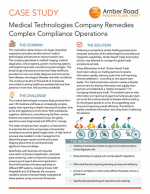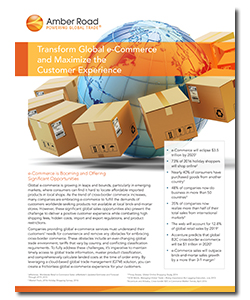Transform Global e-Commerce and Maximize the Customer Experience
Global e-commerce is growing in leaps and bounds, particularly in emerging markets, where consumers can find it hard to locate affordable imported products in local shops.
As the trend of cross-border commerce increases, many companies are embracing e-commerce to fulfill the demands of customers worldwide seeking products not available at local brick-and-mortar stores.
However, these significant global sales opportunities also present the challenge to deliver a positive customer experience while combatting high shipping fees, hidden costs, import and export regulations, and product restrictions.
Companies providing global e-commerce services must understand their customers’ needs for convenience and remove any obstacles for embracing cross-border commerce.
These obstacles include an ever-changing global trade environment, tariffs that vary by country, and conflicting classification requirements.
To fully address these challenges, it’s imperative to maintain timely access to global trade information, master product classification, and comprehensively calculate landed costs at the time of order entry.
By leveraging a cloud-based global trade management (GTM) solution, you can create a frictionless global e-commerce experience for your customers.
Increasing Customer Expectations
Customers expect instant access to order, inventory, shipment and other information. The number of contact points a customer has with a business has multiplied in recent years. Therefore, companies must deliver a seamless and positive e-commerce experience that accounts for the complexities of global commerce.
Growth Through e-Commerce
Today, e-commerce is not optional for retailers, manufacturers, marketplaces and other organizations. Customers and consumers require it. Organizations need it to improve customer experience and increase consumer loyalty. Additionally, global e-commerce allows for the expansion into new markets and the addition of new customers.
- e-Commerce will eclipse $3.5 trillion by 2020
- 73% of 2016 holiday shoppers will shop online
- Nearly 40% of consumers have purchased goods from another country
- 48% of companies now do business in more than 50 countries
- 35% of companies now realize more than half of their total sales from international markets
- The web will account for 12.8% of global retail sales by 2019
- Accenture predicts that global B2C cross-border e-commerce will be $1 trillion in 2020
- e-Commerce sales will outpace brick-and-mortar sales growth by a more than 3-1 margin
What’s Related




Favorites





